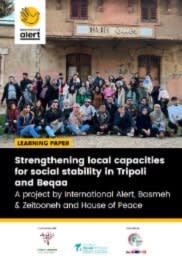Shared spaces for all: public spaces as venues for peacebuilding in Lebanon
Reclaiming public spaces is central to reform and rebuilding relationships across divides after years of conflict.

The issue of public spaces is increasingly at the core of civic movements and discourse of reform in Lebanon, having come to the fore most recently in the protests of October 2019. This was particularly apparent in Beirut and Tripoli. Yet, despite these movements seeking to reclaim rights to access and engage with public spaces, with private encroachments, increasing intra and intercommunity tensions, insecurity, COVID-19 restrictions and ongoing political and financial crises, spaces are becoming more exclusive and closed off to the wider community, including the most marginalised. For example, in Tripoli, International Alert worked with a local organisation to support young men and women from different neighbourhoods in mapping historical, cultural and touristic landmarks in their city. Youth were trained on using GPS technology for mapping around a hundred historical and religious landmarks, schools, pharmacies, restaurants, shops, etc., which were later added to Google Maps. The initiative helped youth, across conflict divides, to regain a sense of pride in and belonging to their city.
The current crisis and the increased citizen interest in public affairs bring opportunities for the movement to push for shifting the discussion from political infighting within patron–clientelist frameworks to reformist and inclusive processes. This presents an opportunity to support processes for facilitating collective decision-making at the municipal level. This includes bringing together a range of participants from diverse political, regional, socio-economic, gender and other backgrounds to discuss key issues, such as reimagining public spaces, and develop joint actions and visions. Municipalities are one of the key partners in this process. Everybody can have a role in designing safe and inclusive public spaces, from technical experts like architects, urban planners, social scientists, to authorities and municipal police, and crucially representatives of diverse elements of the community, including local CSOs, schools and faith-based organisations.
Reconstructing public spaces as a public good.
There is a growing impetus to reimagine people’s relationship with public spaces, raise awareness on their rights of access and reaffirm their commitment to reclaim those rights. In the context of clientelist networks, which are invested in encroachments on public spaces, and considering the broader context of Lebanon’s sectarian power-sharing system, the reality is that such reclamation is a lengthy process, fraught with challenges. There is lack of long-term vision on planning around public spaces and resources and capacities for urban planning are stretched and limited. This has the potential to threaten the gains of the movement and the sustainability of such shared spaces against encroachment.

Where next? Opportunities for opening spaces to support social stability.
In a context of heightening intra and inter-community tensions, informal and public spaces offer marginalised children and youth, including vulnerable Lebanese, refugees and migrant workers, with no access to private youth clubs or other recreational spaces a rare opportunity for interaction and developing social interactions. Working to address these tensions is critical for social stability, recent data from the Bekaa, a region impacted by the Syrian crisis, over 80% of people say relationships between Lebanese and Syrians are negative/ very negative, more than double the 40% in 2020. In the Bekaa, Alert is now applying these lessons working with youth dialogue group members from different backgrounds and nationalities, local leaders and community members to rehabilitate a public space, which can be used by all. Through a placemaking approach, Alert is working with communities to help them identify, understand and analyse how renovating a public garden can best serve diverse needs and bring people together in shared spaces. According to Amani, a Syrian member of the youth dialogue group, the process of consulting the community and co-designing the space can be challenging, but it helped her develop skills in dialogue, listening to others and respecting different points of view. She said that she learned that “no matter how small and simple the imprint you make, with concerted hands and effort, makes a great impact on society.”
We will be able to create a public space that aims to enable everyone to benefit and hopefully this space can be a place to meet the aspirations of the youth participating in this initiative.
Waffa, a Lebanese teacher from a village in Baalbek

Lebanon’s past conflicts have disrupted people’s connectedness to public spaces, and the political obstacles to reclaiming public spaces loom large. However, what the October movement has succeeded in doing is giving back to public spaces their true meaning and function of offering essential opportunities for diverse interaction across class, political, social, generational and gender divides. To build on these advances, public spaces need to be understood as a public good and as a crucial vector for inclusive engagement and peacebuilding. To both reframe and reclaim public spaces as a public good, capitalising on gains made in the October 2019 movement, which can lay the grounds for peacebuilding, it is critical to invest in maintaining safe, inclusive and openly accessible public spaces. This necessitates a shared vision for how these spaces can be used by people to cultivate a shared sense of belonging with the space through community-led social, cultural and economic activities. It is crucial that municipalities are actively engaged in planning and coordinating the use of such spaces. This requires resources, technical capacities for mapping and planning spaces over the long term, as well as political will.
This piece is written by Ruth Simpson and draws on International Alert’s work using placemaking as a tool for peacebuilding in Lebanon, as well as on an article co-authored by Ruth Simpson and Aseel Namaani recently published in The Journal of Public Space Vol. 6 n. 1 https://www.journalpublicspace.org






